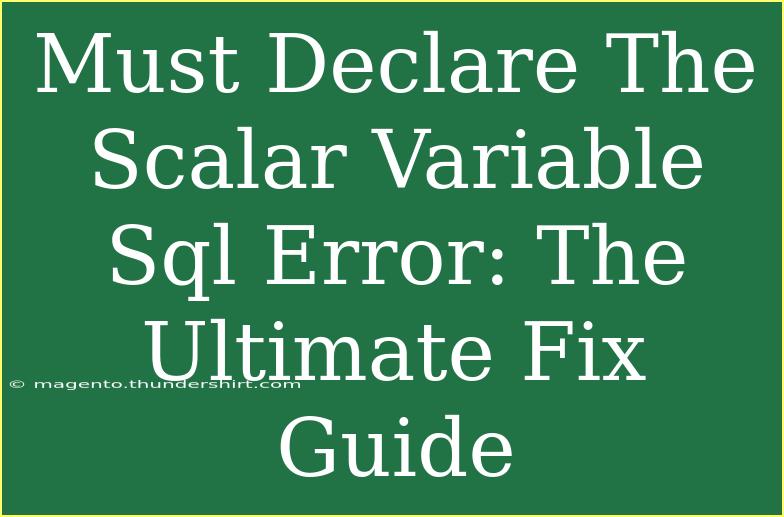Encountering the "Must Declare The Scalar Variable" error in SQL can be quite a head-scratcher, especially for those who are new to the world of databases. This error often occurs when you are working with stored procedures, functions, or scripts, and a variable isn't declared correctly. But fear not! This guide will help you understand what this error means, how to fix it, and provide you with advanced techniques to avoid it in the future.
Understanding the Error
When you see the "Must declare the scalar variable" message, it's a clear sign that SQL Server requires you to define a variable before you use it. This typically happens when:
- You reference a variable that has not been declared.
- The variable is spelled incorrectly.
- The variable is out of scope when you're trying to access it.
For example, if you attempt to use a variable named @age without first declaring it, SQL will raise an error.
Common Causes of the Error
Let’s delve deeper into the most common causes of this error:
-
Variable Not Declared:
Forgetting to declare a variable is the most straightforward reason for this error. SQL requires all variables to be declared before they are used.
-
Typo in Variable Name:
A simple typo in the variable name will lead to this error. For example, if you declare @myVar, but later try to use @myvar, you'll face this issue.
-
Scope Issues:
Variables have a specific scope in SQL. If you declare a variable inside a stored procedure or function, it won't be accessible outside of that context.
-
Using a Variable Before Declaration:
If you try to use a variable before you declare it in your script, SQL will throw this error.
Fixing the Error
Now, let’s look at how to fix the "Must declare the scalar variable" error.
Step 1: Declare Your Variable
Make sure that you declare your variable using the DECLARE statement before you use it in your code. Here’s an example:
DECLARE @myVar INT;
SET @myVar = 10;
SELECT @myVar;
Step 2: Check Spelling
Verify that the variable is spelled correctly each time it is referenced. Consistency is key!
Step 3: Review Variable Scope
If you’re working within a stored procedure or a function, ensure that you are not trying to access a variable declared within a different scope. For instance:
CREATE PROCEDURE MyProcedure
AS
BEGIN
DECLARE @myVar INT;
SET @myVar = 10;
END;
SELECT @myVar; -- This will throw an error because @myVar is out of scope.
Step 4: Debugging
If you are still having trouble, consider breaking down your SQL script into smaller parts and testing each segment independently. This can help identify where the variable is not declared.
Helpful Tips for Avoiding the Error
- Commenting Out Code: If you are temporarily removing a part of your code, comment it out instead of deleting it to help keep track of your variables.
- Consistent Naming: Stick to a naming convention that you will use throughout your scripts.
- Use SQL Server Management Studio (SSMS) IntelliSense: This tool helps in suggesting variable names as you type, minimizing the chance of errors.
Troubleshooting Common Issues
If the error persists after following the above steps, consider these troubleshooting techniques:
- Review the Entire Script: Sometimes the error may be caused by an earlier statement in your script that affects variable declaration.
- Check for Conditional Logic: Ensure that your variable is declared in all branches of any conditional logic (like
IF statements) before you try to use it.
- Reset Session: Occasionally, SQL Server sessions can have lingering state issues. Restart your session to see if it resolves the problem.
Practical Example
Imagine you are creating a simple script to calculate the average sales. Your initial script may look like this:
SELECT AVG(SalesAmount)
FROM Sales
WHERE SalesDate >= @StartDate AND SalesDate <= @EndDate;
If you haven’t declared @StartDate and @EndDate, SQL will raise the "Must declare the scalar variable" error. You would need to modify your script as follows:
DECLARE @StartDate DATE = '2023-01-01';
DECLARE @EndDate DATE = '2023-12-31';
SELECT AVG(SalesAmount)
FROM Sales
WHERE SalesDate >= @StartDate AND SalesDate <= @EndDate;
<div class="faq-section">
<div class="faq-container">
<h2>Frequently Asked Questions</h2>
<div class="faq-item">
<div class="faq-question">
<h3>What is a scalar variable in SQL?</h3>
<span class="faq-toggle">+</span>
</div>
<div class="faq-answer">
<p>A scalar variable in SQL is a variable that holds a single value, such as an integer, decimal, or string.</p>
</div>
</div>
<div class="faq-item">
<div class="faq-question">
<h3>How do I declare a variable in SQL?</h3>
<span class="faq-toggle">+</span>
</div>
<div class="faq-answer">
<p>You can declare a variable using the syntax: DECLARE @VariableName DataType; For example, DECLARE @myVar INT;</p>
</div>
</div>
<div class="faq-item">
<div class="faq-question">
<h3>Why is my variable showing as undeclared in a stored procedure?</h3>
<span class="faq-toggle">+</span>
</div>
<div class="faq-answer">
<p>This could be due to the variable being declared inside the procedure but being accessed outside its scope. Ensure the variable is declared within the same scope where it is used.</p>
</div>
</div>
<div class="faq-item">
<div class="faq-question">
<h3>Can I use a variable defined in one stored procedure in another?</h3>
<span class="faq-toggle">+</span>
</div>
<div class="faq-answer">
<p>No, variables defined in a stored procedure are local to that procedure. You will need to pass them as parameters if you want to use them elsewhere.</p>
</div>
</div>
</div>
</div>
Recapping what we’ve learned, the "Must declare the scalar variable" error is often due to the incorrect use of variable declarations in SQL. Remember to always declare your variables, check for spelling mistakes, and understand variable scope. By following the tips and steps outlined in this guide, you’ll be well on your way to avoiding this common pitfall. Keep practicing, explore more SQL tutorials, and soon you'll master variable management in SQL like a pro!
<p class="pro-note">💡Pro Tip: Always declare your variables at the beginning of your scripts to avoid scope issues!</p>
